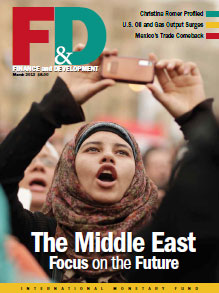
Typical street scene in Santa Ana, El Salvador. (Photo: iStock)
IMF Survey : Arab Countries in Transition Seek Path to Strong, Inclusive Growth
February 28, 2013
- Region pursues economic and political stability in aftermath of historic uprising
- Comprehensive political, social, and financial reform critical to economic success
- Middle-class aspirations to boost inclusive growth
Two years ago, citizens in the Arab world—fired by their ideals and visions of a better life—ignited a social movement that inspired people around the globe. In Egypt, Jordan, Libya, Morocco, Tunisia, and Yemen—the so-called Arab countries in transition—people embraced change, ushering in a new era.

Countries in the Middle East face a difficult road ahead; Mediterranean coast in Alexandria, Egypt (photo: Luis Otero/Hemis/Zumapress.com)
MIDDLE EAST
The latest issue of the IMF’s quarterly magazine, Finance & Development (F&D), looks at the challenges this transition presents, focusing both on the long-standing forces that have shaped the region’s economies and fresh solutions that can help them achieve strong, inclusive growth in the future.
A guiding vision
While political and economic stability is the immediate goal, modernization and diversification of the region’s economies are essential if the region is to create new jobs and provide equitable opportunity for all, writes Masood Ahmed, head of the IMF’s Middle East and Central Asia Department. “Restless populations’ growing impatience for quick results—in the form of new jobs and better incomes and social conditions—is an incentive for policymakers to proactively introduce changes to the existing economic systems.”
Bread and freedom go together
These reforms must be implemented in parallel with political change, says Marwan Muasher, Jordanian diplomat and author. He reminds readers that the region has faced dire economic challenges before, and offers five lessons from the past:
• Economic reform will not work without political reform: if people feel they have been part of the political consultation process, they will tolerate economic challenges.
• Growth policies must be inclusive, allowing the less privileged to improve their lives.
• Economic reform plans must be prepared with the general public’s input.
• Economic reforms must be measurable and have a clear final goal.
• Communication must be planned as part of the reform process, to garner buy-in from the public.
While the global press described the revolution of two years ago as an “Arab renaissance,” what mattered to most people in the region was “decent work, fair access to education and health care, support in old age, accountable government, and a say in how the country is run,” say Nada al-Nashif and Zafiris Tzannatos of the International Labour Organization.
Business, trade, and finance drive growth
The limited effectiveness of the financial sector in the Middle East is another factor holding it back, according to IMF economists Adolfo Barajas and Ralph Chami. A stable supply of funds and better access to credit would boost economic growth in Arab countries—as would greater integration of trade in the region, according to the IMF’s Amine Mati.

Vali Nasr, Dean of Johns Hopkins University’s School of Advanced International Studies, underscores in an opinion piece the vital role that small and medium-sized business play in a successful democratic transition. Complex business regulations, corruption, and inefficiencies obstruct business startups and crush innovation. As a result, the Arab world is falling behind other developing regions. “Middle-class entrepreneurs represent the best hope for the betterment of their countries,” he argues.
Only by opening up will the transition countries achieve the broad-based growth their societies desperately need, says David Lipton, the IMF’s First Deputy Managing Director, in a “Straight Talk” column. While each country in the region must carve out its own path for change, the international community must provide the financing, trade access, and policy advice needed to effect positive change.
â– Also in the March 2013 issue of F&D, IMF economists write about the sudden surge in oil and gas production in the United States and how that could shake up global energy markets; research on the impact of higher-quality education of civil servants on their country’s economic prospects; and how Mexico’s economic competitiveness rebound is helping it regain a share of the U.S. import market it had lost to China. In our regular People in Economics column, F&D profiles Christina Romer, former chair of the U.S Council of Economic Advisors and an architect of the U.S. stimulus package.


